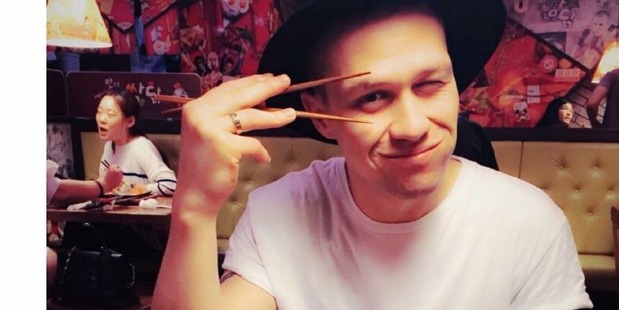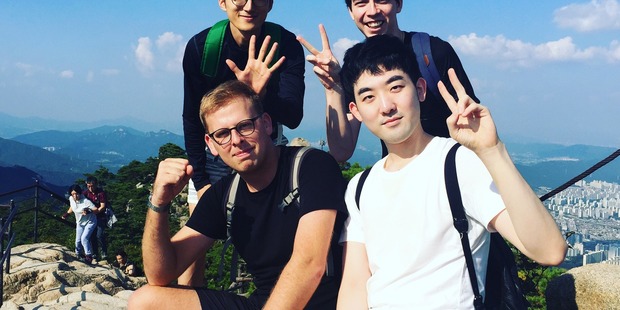
Images of tanks lining up along the Korean Peninsula's northern beaches; the growth of North Korea's nuclear programme; talk of swift punitive measures and retaliations from the North to the South and vice versa; US President Donald Trump's equally aggressive rhetoric that suggests a "major conflict" was possible - all give a sense of rising tensions in the area.
While New Zealand is said to be one of the safest countries on Earth in the event of a nuclear strike on the peninsula, a number of Kiwis could still be in the firing zone if military action broke out.
Currently 364 New Zealanders have registered their presence in Korea with the Ministry of Foreign Affairs - one of these is said to be in North Korea.
The Herald speaks to Kiwis living in Korea about what the reality of life is like there and if they harbour any concerns amidst the rising political tensions.

Matthew Williams, 27 is an English teacher in Seoul.
He said the Asian city's air quality was a stronger factor pushing him to leave than any threat of nuclear war.
The former Cantabrian has been living in South Korea for just over four years and is currently living in a neighbourhood called Itaewon, right next to an American military base.
Despite the growth in attention the Western media has given the tensions between the North, the South and the US Williams said it was only "slightly more apparent than usual".
"Koreans have grown up with this constant aggressive rhetoric being spouted from the north, so they're used to it."
He said most believed it was all just a big bluff on the part of the North.
"They'd tease me if I expressed any real concerns about it. We often laugh at the way western media covers the situation here."
Williams said there often tended to be a rise in the tensions preceding an election. South Koreans were heading to the polls early on May 9, after the impeachment of its former president, Park Guen-Hye.
"North Korea always tries to get attention in the lead up to elections in the south. I arrived during the last election in 2013 and I'd say the situation then felt very similar."
"The only difference now is Donald Trump and his propensity for escalating things by talking big without considering or caring about the consequences."
Williams said with the two leading candidates in the South Korean elections appearing more liberal in their approach to the north, there were hopes the situation would de-escalate in time.
"I'm not an expert and I might regret saying this, but I'd feel more concerned with the risk of a big earthquake happening while I'm living back in New Zealand than I do with war breaking out while I'm here.
"The air quality here is pushing me towards leaving more than any tensions with North Korea."

Joshua Rapana, 28, is an English teacher in the city of Suwon, an hour train ride to the south of Seoul. He said for the most part life was just business as usual.
The teacher, who was originally from Whangarei, said western media had a tendency to portray the situation as being a lot more hectic than the reality.
"Here it is another day of life. This happens every time this time of year when the South Korean and US forces do training together. The North always provokes the South and the US.
"You get the odd WTF moments when they test nukes underground and it's just 500km away from me."
However, he said people were "pretty chilled" about the situation and he hadn't seriously thought of leaving.
Rapana said the new US President was a bit of a volatile addition to the political scene that raised some concerns.
"The most concerned I've been about the situation is now. Some of the things he says are unpredictable."
He said the talk of the US vs the North left South Koreans stuck in the middle.
Rapana asked his girlfriend of two years, what she'd do if war broke out.
"She said: 'What can I do? I can't just cross the border into a different country."
Rapana's move to the Asian nation was prompted by what he felt was a lack of job opportunities in New Zealand after he graduated.
"Life is pretty good here. It's just typical, like every other job, you wake up and go to work."
He said South Korea was quite different from New Zealand. Rapana described it as a tech-orientated culture with a unique Asian twist.
As one of relatively few foreigners in the country, Rapana said the attention he drew was a bit of a challenge at times.
"They stare at you when you walk down the street, because they have never seen a foreigner so that can be a bit unsettling."
The Ministry of Foreign Affairs advised on its site there were "no significant security risks" in South Korea.
It did say relations between the North and South could be tense with "occasional exchanges of live fire".
"Further provocations or reactions cannot be ruled out."
Mfat said tensions could escalate with little warning and New Zealanders were advised to monitor the media to stay informed of any developments.
It advised there was "some risk" to security for Kiwis in North Korea due to the extensive restrictions placed on foreigners and international tensions.







